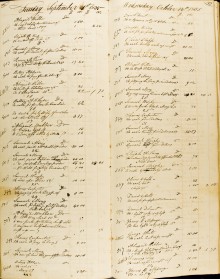 Rich with information, account books can reveal nuanced social and economic relationships in American communities of the 18th and early 19th centuries. Today scholars and students use accounts books to track the economic development and behavior of individuals and families and to expose the wider network of exchange of which they were a part. Once transcribed and analyzed, layers of information recorded in account books can help to answer historical questions regarding changes in standard of living, distribution of wealth, and the role of “the poor” in local, regional, and global communities, according to Kathryn Tomasek, Professor of History at Wheaton College.
Rich with information, account books can reveal nuanced social and economic relationships in American communities of the 18th and early 19th centuries. Today scholars and students use accounts books to track the economic development and behavior of individuals and families and to expose the wider network of exchange of which they were a part. Once transcribed and analyzed, layers of information recorded in account books can help to answer historical questions regarding changes in standard of living, distribution of wealth, and the role of “the poor” in local, regional, and global communities, according to Kathryn Tomasek, Professor of History at Wheaton College.
Join us on Thursday, February 12, 12:30-1:30pm in the Scholars’ Collaborative, Homer Babbidge Library, Level 4 for a talk by Kathryn Tomasek, Director of the Wheaton College Digital History Project, a teaching project in which students transcribe and markup primary sources from previously hidden archival collections. History students in Tomasek’s courses have been transcribing and marking up the day book of Laban Morey Wheaton, a member of the family that founded Wheaton Female Seminary in the 1830s. In this talk, Tomasek discusses both the teaching assignments and the research that has emerged from them. Details about this talk and others in the series can be found at Conversations in Digital Scholarship.
